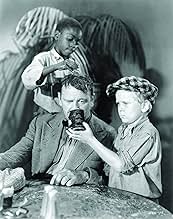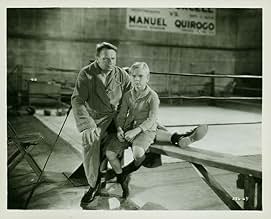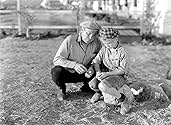IMDb-BEWERTUNG
7,2/10
3846
IHRE BEWERTUNG
Füge eine Handlung in deiner Sprache hinzuAn alcoholic ex-boxer struggles to provide a good living for his son.An alcoholic ex-boxer struggles to provide a good living for his son.An alcoholic ex-boxer struggles to provide a good living for his son.
- 2 Oscars gewonnen
- 5 Gewinne & 3 Nominierungen insgesamt
Roscoe Ates
- Sponge
- (as Rosco Ates)
Dannie Mac Grant
- Boy Taunting Dink
- (Nicht genannt)
Frank Hagney
- Manuel Quiroga - Mexican Champ
- (Nicht genannt)
Dell Henderson
- The Doctor
- (Nicht genannt)
Tom McGuire
- Los Angeles Promoter
- (Nicht genannt)
Walter Percival
- Los Angeles Promoter
- (Nicht genannt)
Lee Phelps
- Louie - the Bartender
- (Nicht genannt)
Andy Shuford
- Boy at Racetrack
- (Nicht genannt)
Dan Tobey
- Ring Announcer
- (Nicht genannt)
Empfohlene Bewertungen
Yes we've seen it thousands of times, but each time is a wonderful experience. You know the story by heart, but you discover new things again and again. This film is King Vidor in all his glory. Fantastic photography, great shots. For a film of 1931, it's crazy how the image remains beautiful.
The story is gripping and the acting is superb even though at times over the top.
Deserves to be shown and watched again and again.
Probably the greatest disconnect among film personalities in history is that of Wallace Beery. On the screen he played these lovable oaf types, even when he was a bad guy. Off the screen he was a violent man, given to fits of temper and I can't recall anyone having a good word to say about him. Possibly for that reason Beery could lay claim to the fact he was the greatest actor in films. The crowning achievement of his career was his Oscar winning performance in The Champ.
Of course Beery could not have done it without little Jackie Cooper as well. It's their scenes together that make the film as memorable as it is. Instead of splitting the Academy Award with Fredric March who was also awarded The Best Actor for Dr. Jekyll and Mr. Hyde, possibly Beery should have given half of his half to Cooper.
Beery is actually a former champ in this film. He's an over the hill, alcoholic pug who lives a hand to mouth existence with his young son Cooper. He split from his wife Irene Rich years ago, taking Cooper and she'd like to get him back. She's pretty well fixed now with a new and rich husband and a daughter by that marriage.
The fly in the ointment is that Cooper is really attached to his father and blind to the faults he has. And Beery really does love his son, the only really happy part about his life. He's probably way too old to be seriously in the fight game, but he needs the dough for his kid.
The Champ is guaranteed four handkerchief film even now almost eighty years after its debut. A remake was done in 1979 with Jon Voight and Rick Schroder in the main two roles, but it wasn't a patch on this one.
Of course Beery could not have done it without little Jackie Cooper as well. It's their scenes together that make the film as memorable as it is. Instead of splitting the Academy Award with Fredric March who was also awarded The Best Actor for Dr. Jekyll and Mr. Hyde, possibly Beery should have given half of his half to Cooper.
Beery is actually a former champ in this film. He's an over the hill, alcoholic pug who lives a hand to mouth existence with his young son Cooper. He split from his wife Irene Rich years ago, taking Cooper and she'd like to get him back. She's pretty well fixed now with a new and rich husband and a daughter by that marriage.
The fly in the ointment is that Cooper is really attached to his father and blind to the faults he has. And Beery really does love his son, the only really happy part about his life. He's probably way too old to be seriously in the fight game, but he needs the dough for his kid.
The Champ is guaranteed four handkerchief film even now almost eighty years after its debut. A remake was done in 1979 with Jon Voight and Rick Schroder in the main two roles, but it wasn't a patch on this one.
'The Champ' seems to have been a blueprint film for all the others of the tough-tender school that followed it, and - owing entirely to Jackie Cooper's playing perfectly off of Wallace Beery's has-been, alcoholic pug - it's perfectly charming.
Yes, the fight scene is rather hokey: had they tried to use Wallace Beery's telegraphed-the-day-before roundhouse punches, even the toe-to-toe sluggers of 'The Champ's bygone day wouldn't have survived one round in the ring. But the film isn't about the fight scene, it's about the love of father for son and son for father - and to this day 'The Champ's' story artfully delivers its soft knock-out blow with tender sucker punches and love-taps to the heart.
Compared with today's fare 'The Champ's' pacing is slow but the time taken works nicely, especially in the one-on-one scenes captivatingly played by Cooper and Beery.
There's plenty of archetypal King Vidor composition-in-frame that's still imitated today, and in many instances the lighting is exemplary of the gorgeous black & white textural artistry of Hollywood's Golden Age. Lovers of classic B&W work might want to grab more than a few frames from the DVD.
Beery's work is quite good here, but Jackie Cooper's remarkable, potent chops steal the show - and your heart; though 'The Champ' has a good many fine, classical attributes there's none better in it than Cooper's unforgettable performance.
Yes, the fight scene is rather hokey: had they tried to use Wallace Beery's telegraphed-the-day-before roundhouse punches, even the toe-to-toe sluggers of 'The Champ's bygone day wouldn't have survived one round in the ring. But the film isn't about the fight scene, it's about the love of father for son and son for father - and to this day 'The Champ's' story artfully delivers its soft knock-out blow with tender sucker punches and love-taps to the heart.
Compared with today's fare 'The Champ's' pacing is slow but the time taken works nicely, especially in the one-on-one scenes captivatingly played by Cooper and Beery.
There's plenty of archetypal King Vidor composition-in-frame that's still imitated today, and in many instances the lighting is exemplary of the gorgeous black & white textural artistry of Hollywood's Golden Age. Lovers of classic B&W work might want to grab more than a few frames from the DVD.
Beery's work is quite good here, but Jackie Cooper's remarkable, potent chops steal the show - and your heart; though 'The Champ' has a good many fine, classical attributes there's none better in it than Cooper's unforgettable performance.
Father/son movies were nothing new when November 1931's "The Champ" was released. But its ending is what struck movie audiences as unique, one of cinema's most potent tear jerkers ever projected on the screen. "The Champ is one of the greatest love stories ever put to film, the story of a man who wants to do right but fails and a son who never gives up on him," film reviewer Jerry Roberts writes. "(Wallace) Beery is what gives the film its foundation."
Beery performance was so powerful he won the 5th Academy Awards' Best Actor in a virtual tie with Frederic March for his role in 1931's "Dr. Jekyll and Mr. Hyde." After receiving the statuette, Berry, in the middle of renegotiating his contract with MGM, demanded he be paid one dollar more than the studio's highest paid actor. The agreement made him the richest salaried Hollywood actor at that time. Francis Marion wrote "The Champ's" screenplay especially with Beery in mind. It proved to be a great inspiration since she won the Academy Award's Best Story for her work on bringing bucketful of tears to millions of viewers.
Her tale has Andy "Champ" Purcell (Beery), a former world heavyweight title holder, down on his luck and turns to drink and gambling. Through his divorce, Andy was able to keep his son, Dink (Jackie Cooper), until his mother Linda (Irene Rich), sees him at the racetrack with his father. Remarried into wealth, Linda gets the court to gain custody of Dink. In a classic highly emotional separation scene, Andy, in prison, says goodbye to his loyal son, only to have Dink jump off the train transporting him to his mother's home. He wants to see his father fight one more match facing off against the Mexican champion in what turns out to be a brutal match. A preview audience loved the movie, except for the ending. MGM's head of production, Irving Thalberg, had the match reshot, ending with one of the most emotional 18-handkerchief scenes in cinema.
Despite the warmth displayed on the screen between the two actors, Beery and Cooper did not get along. Beery hated childhood actors, and it was evident he didn't enjoy his time with the nine-year-old Jackie. Publicly, he diplomatically described Cooper as "a great kid," but the boy claimed the actor treated him like "an unkempt dog." In retrospect, Cooper said it was pure jealousy that made Beery, in scene after scene, try to upstage him. Beery was so fed up with the director calling for tight shots of Cooper's teary face, he demanded in his new MGM contract that no juvenile actor could ever have a close-up in any picture with him. Beery vowed he would never appear in another movie with Cooper again after "The Champ" wrapped. But so popular was the acting duo that he took back his promise in the mid-1930s, sharing screen time again with Cooper in three more films.
Besides Beery's tied win, the Academy nominated "The Champ" for Best Picture as well as its director, King Vidor for Best Director. Francis Marion's award-winning script was so brilliant Red Skelton adapted it into his 1952 film, "The Clown," where he plays the Andy character as a has-been clown rather than a boxer. Later generations are more familiar with director Franco Zeffirelli's 1979 version of "The Champ" with Jon Voight, Faye Dunaway and Ricky Schroder as the son. This film was actress Joan Blondell's last movie.
Beery performance was so powerful he won the 5th Academy Awards' Best Actor in a virtual tie with Frederic March for his role in 1931's "Dr. Jekyll and Mr. Hyde." After receiving the statuette, Berry, in the middle of renegotiating his contract with MGM, demanded he be paid one dollar more than the studio's highest paid actor. The agreement made him the richest salaried Hollywood actor at that time. Francis Marion wrote "The Champ's" screenplay especially with Beery in mind. It proved to be a great inspiration since she won the Academy Award's Best Story for her work on bringing bucketful of tears to millions of viewers.
Her tale has Andy "Champ" Purcell (Beery), a former world heavyweight title holder, down on his luck and turns to drink and gambling. Through his divorce, Andy was able to keep his son, Dink (Jackie Cooper), until his mother Linda (Irene Rich), sees him at the racetrack with his father. Remarried into wealth, Linda gets the court to gain custody of Dink. In a classic highly emotional separation scene, Andy, in prison, says goodbye to his loyal son, only to have Dink jump off the train transporting him to his mother's home. He wants to see his father fight one more match facing off against the Mexican champion in what turns out to be a brutal match. A preview audience loved the movie, except for the ending. MGM's head of production, Irving Thalberg, had the match reshot, ending with one of the most emotional 18-handkerchief scenes in cinema.
Despite the warmth displayed on the screen between the two actors, Beery and Cooper did not get along. Beery hated childhood actors, and it was evident he didn't enjoy his time with the nine-year-old Jackie. Publicly, he diplomatically described Cooper as "a great kid," but the boy claimed the actor treated him like "an unkempt dog." In retrospect, Cooper said it was pure jealousy that made Beery, in scene after scene, try to upstage him. Beery was so fed up with the director calling for tight shots of Cooper's teary face, he demanded in his new MGM contract that no juvenile actor could ever have a close-up in any picture with him. Beery vowed he would never appear in another movie with Cooper again after "The Champ" wrapped. But so popular was the acting duo that he took back his promise in the mid-1930s, sharing screen time again with Cooper in three more films.
Besides Beery's tied win, the Academy nominated "The Champ" for Best Picture as well as its director, King Vidor for Best Director. Francis Marion's award-winning script was so brilliant Red Skelton adapted it into his 1952 film, "The Clown," where he plays the Andy character as a has-been clown rather than a boxer. Later generations are more familiar with director Franco Zeffirelli's 1979 version of "The Champ" with Jon Voight, Faye Dunaway and Ricky Schroder as the son. This film was actress Joan Blondell's last movie.
THE CHAMP feels like a quintessential Depression movie: it captures the poverty, pessimism, and sense of desperation so many experienced during that period. Beery and Cooper's father-son relationship is highly touching, and the latter's performance is one for the ages. Cooper's character is a child forced into an adult role due to his father's alcoholism and the hardboiled, macho attitudes of the men around him, yet he still possesses the naivete and steadfast optimism only children possess. It's a complex role for a kid to nail down, but Cooper hits every note perfectly.
THE CHAMP could have easily been a soppy mess, but the gritty aesthetic and underplaying of the actors keep it from such melodramatic excess.
THE CHAMP could have easily been a soppy mess, but the gritty aesthetic and underplaying of the actors keep it from such melodramatic excess.
Wusstest du schon
- WissenswertesWallace Beery actually got one less vote than Fredric March in the 1931/1932 Academy Awards voting for best actor, but the rules at the time considered anyone with one or two votes less than the leader as being in a tie. So both got Academy Awards.
- PatzerAs Dink plays on the balcony awaiting his meeting with Linda, he steals chewing gum and candy for himself off of a table on the balcony. He then steals the contents of a box of cigarettes, saying that he'll "bring some home for the Champ", and stuffs them into his right jacket pocket. However, during the ride home, Andy reaches into Dink's right jacket pocket and finds cigars rather than the cigarettes which we clearly saw Dink steal.
- Zitate
[Dink compares the swanky home to his own]
Dink Purcell: The Champ and I ain't fixed up swell as this, but our joint's more lively.
- VerbindungenEdited into The Our Gang Story (1994)
- SoundtracksThe Monkeys Have No Tails in Pago Pago
(uncredited)
Composer uncertain
Sung a cappella by Wallace Beery
Top-Auswahl
Melde dich zum Bewerten an und greife auf die Watchlist für personalisierte Empfehlungen zu.
- How long is The Champ?Powered by Alexa
Details
- Laufzeit1 Stunde 26 Minuten
- Farbe
- Seitenverhältnis
- 1.20 : 1
Zu dieser Seite beitragen
Bearbeitung vorschlagen oder fehlenden Inhalt hinzufügen





































